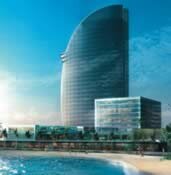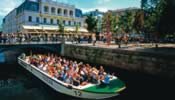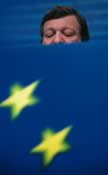Inflight Magazine of Brussels Airlines
Welcome to the Inflight Magazine of Brussels Airlines
Business trends
Boyd Farrow rounds up what’s happening in the business world across Europe
Illustration Jason Pickersgill/Acute Graphics
Images Alamy, Tony French, Dewhurst Photography
Radar
 Profitable, but not wildly so
Profitable, but not wildly so
Zoos are booming, with as many as 600 million people visiting them each year, according to the World Association of Zoos and Aquariums. And in Europe, they’re among the most visited of all tourist attractions.
Last year, more than two million people visited Vienna’s Schönbrunn Zoo, which was just voted Europe’s best zoo according to the Zoological Society of London. Barcelona Zoo received more than one million visitors in 2008, and is the city’s most popular attraction after Museu Picasso, while Valencia recently opened the first phase of the €70m Bioparc Valencia, reproducing the vegetation, terrain and sounds of the animals’ ecosystems over 25 acres.
The stock market-listed Berlin Zoo is also wildy profitable, thanks to stars such as Knut, who in December 2006 became the first polar bear to be born there in over 30 years. In 2007, more than three million visitors came to the zoo, for which Knut earned €5m in ticket sales and merchandise.
Unfortunately, however, Knut doesn’t belong to the Berlin Zoo. His father, Lars, was on loan from Neumünster Zoo, which is the rightful owner of Lars’ offspring. In May, the directors of both zoos met in a Berlin District Court. Neumünster Zoo wasn’t impressed by Berlin’s offer of €350,000 and “perhaps a few penguins” in exchange for Knut. Now the zoos have until July 13 to reach a settlement. Failing that, a court ruling will be passed down on 1 September.
Why are we here?
 In another courtroom
In another courtroom
Take the hint, L’Oréal: it isn’t worth it. The French cosmetics group has been told by the UK high court that eBay is not legally accountable for the sale of counterfeit L’Oréal cosmetics on its UK website. Judges in Belgium and France had previously ruled that the online auction group is not ultimately responsible for policing counterfeit sales.
Judge Richard Arnold said eBay is a trading platform only and therefore can’t be held responsible for its users’ actions. However, the judge agreed that eBay could do more to prevent counterfeiting, suggesting 10 measures the auction group might adopt. These include filtering lots before they’re placed on the site and requiring sellers to disclose their names and addresses.
European courts have been inconsistent in their attitude towards eBay, with other cosmetics groups winning cases in the past. Last year, a French court ordered eBay to pay compensation to Hermes and LVMH after counterfeits were sold on the auction site.
Radar
 Spreading hope
Spreading hope
Politicians and bankers may have slid further down the list of people we trust, but which companies do we think are the most reputable? According to the Reputation Institute Global Pulse 2009, the world’s most trustworthy company is Italy’s Ferrero, maker of Nutella chocolate spread, those amusing faux-sophisticated chocolates Ferrero Rocher and Tic Tac breath mints.
In the number two spot is Sweden’s Ikea – presumably none of those polled has ever tried to follow the bookcase-building instructions – and in third place is America’s Johnson & Johnson.
Astonishingly, last year’s two most reputable brands, Toyota and Google, are now 59th and 23rd respectively.
The Global Reputation Pulse measures the corporate reputations of the world’s 600 largest companies based on “consumers’ trust, esteem, admiration, and good feeling about a company across seven dimensions of reputation in 32 countries”. The survey also found that 57% of consumers would give the most reputable companies the benefit of the doubt in a time of crisis. Four out of 10, however, would refuse to support the 20 least reputable global companies in a crisis. On the other hand, if they’re handing out free chocolate…
Growing gains
 Burning rubber
Burning rubber
Sex is hardly a bad business to be in during a recession, but it isn’t only strong sales of Durex condoms that have helped the UK’s SSL International to deliver a 33% rise in full-year pre-tax profits to €84.2m, with total revenues up 20% to €707m.
The strategy of transforming Durex from a straightforward form of contraception and protection into a brand that promises better sex appears to be working. In just two years Durex Play, the label used on vibrators, penis rings, oils and lubricants, has become a €50m brand in its own right. SSL has recently launched a variety of new products, spurred on by its research that laments “40% of women are not satisfied with their orgasms” and “67% do not orgasm on a regular basis”.
Engorged by its recent successes, SSL has recently acquired a controlling stake in BLBV, the owner of Russia’s leading condom brand, Contex, and the company behind the distributors of condoms throughout the Baltic region and Romania. SSL is also snapping up businesses in Russia, Ukraine and Switzerland, and is on the prowl in Korea, Japan and Latin America, where the field is wide open because of the lack of private-equity competition. This month, SSL will also open the world’s biggest condom factory in China, which will turn out one billion condoms a year.
Drawing board
 Sparking a relationship
Sparking a relationship
Daimler has taken a 10% stake, worth about €36m, in Tesla Motors, the Californian electric-car outfit the German giant had been working with to build 1,000 all-electric versions of its tiny Smart car. It wasn’t so much an exclusive relationship that Daimler wanted, but a jolt of entrepreneurial spirit. According to Dieter Zetsche, Daimler’s chairman and boss of Mercedes-Benz Cars, “making changes fast is hard for big companies. We want to go down new paths and we believe the combination of such a young, very ingenious company and a very experienced, long-time successful company is a good one in order to find new approaches fast.”
Tesla is working on its Model S, an electric family car that it hopes to sell for around €35,000, but it needs around €300m to put the car into production. Tesla claims to already have more than 1,000 reservations for the car, which will “carry seven people and travel 300 miles on a single charge” when it’s delivered in 2011.
While enthusiastic, Daimler is hedging its bets. It has founded a joint venture with Essen-based Evonik Industries to make its own batteries and has invested in German battery maker Li-Tec, whose cells will appear in Mercedes-Benz vehicles.
Upgrade your trip…
 Gain in Spain
Gain in Spain
If your business is taking you to Spain, you’ll be delighted to know hotels in the country are seeing occupancy levels drop by as much as 50% – partly because of the recession, but particularly because the sterling-hammered British are staying away. Consequently, prices are plummeting even in premier destinations such as Barcelona and Seville.
According to hotel-booking agency Sevilla5.com, rates in some city hotels dropped by 50% in the early season compared with 2008. In May – high season in the city – prices were down 15-20% on average. Even Seville’s magnificent Gran Meliá Colón, which reopened in February on the 80th anniversary of its original launch, has been offering four-for-three night specials. Meanwhile, special offer-festooned advance booking has started for W Barcelona, which will open at the beginning of October. W’s parent company, Starwood, says the 473-room would-be iconic tower will be the brand’s flagship hotel in western Europe.
Traffic report
 Stockholm for the holidays
Stockholm for the holidays
Despite the financial crisis and a weak economy, Sweden’s tourism industry is anticipating another record year thanks to the persistently weak krona. Last year, the country’s tourism industry enjoyed a turnover of SEK 245bn (€23bn), up 4% from the previous year. The weak krona means Swedes are staying at home instead of travelling abroad, while the exchange rate is enticing more foreign tourists, particularly from Denmark, Norway and Germany.
Sweden already got a boost in January and February with its busiest ski season for years. A recent survey of Swedish tourist professionals revealed 65% are very optimistic about the rest of 2009, while just 8% had a gloomy outlook.
Not really…
 Loitering on the Reeperbahn
Loitering on the Reeperbahn
Hamburg claims to have reached a tentative deal with Google limiting the scope of its Street View service, which offers ground-level photos of cities worldwide. Hamburg is demanding the faces of people captured in the images are pixelated so they can’t be recognised before they’re used or archived. It wants the same for vehicle licence plates and other potentially identifiable private data, and for the company to delete any images of homes if asked to by owners – both online and in any data it saves.
Hamburg officials said numerous residents and communities had issued complaints in recent weeks, with at least two citizens phoning daily. Johannes Caspar, the Hamburg official responsible for privacy issues, says Google has responded to an ultimatum to address 12 potential violations of German laws and that imminent talks will focus on written assurances that Google will delete data that has not been pixelated.
Google initially suspended its work in north Germany because of the outcry, but has now begun photomapping Hamburg and Frankfurt. Last year, the service drew controversy in the UK when a woman divorced her husband after finding evidence on Street View that he had cheated on her. An image showed his car parked in front of his mistress’s home.
Traffic report
 Search engineering
Search engineering
Nearly 10% of all search terms entered by European consumers shopping on the internet are related to particular brands, a study by Bigmouthmedia has found.
The analysis of 600,000 online searches conducted in Denmark, France, Germany, Italy, Norway, Spain, Sweden and the UK found that the average number of brand-specific searches in these countries has now reached 9.4%. According to the research company, Germany posted the highest number of brand-based enquiries overall with 13%, compared with 12% in the UK, 9% in France and Italy, and 8% in the remaining four countries.
The research also found that consumers are increasingly using longer search terms when they’re seeking information online. Entries with one keyword accounted for just less than 22% of all enquiries, reaching a high of 24% in Denmark and a low of 19% in Italy, and two-word searches took a similar share. That total fell slightly to 19% for three-word searches and to 13% for information requests with four keywords.
Italian consumers were most likely to use four-word search terms, doing so 16% of the time, compared with just 10% in Spain.
IN POLITICS
Brigid Grauman snoops around Brussels’ corridors of power
Illustration Wilford Almoro/illustrationroom.com.au
Images Rex Features
Recession a boost for Europe?
 It was June last year that Irish voters threw a spanner in the works of the European Union by voting ‘No’ in a referendum on the Lisbon Treaty. But now, with the country in the grip of a deep recession, the signs are that when the Irish go back to the polls in early October, they’ll be much more aware of the EU’s benefits and will give the reform treaty a thumbs up.
It was June last year that Irish voters threw a spanner in the works of the European Union by voting ‘No’ in a referendum on the Lisbon Treaty. But now, with the country in the grip of a deep recession, the signs are that when the Irish go back to the polls in early October, they’ll be much more aware of the EU’s benefits and will give the reform treaty a thumbs up.
Ireland’s No vote was widely thought to reflect disenchantment with the country’s government and misunderstanding about the nature of the treaty. So hopes are now rising in Brussels that the Lisbon Treaty’s streamlining of EU decision-making will usher in a positive phase in European-level politics.
It will be much needed, because Ireland isn’t the only country where recession is starting to do serious damage to what, in the wake of last year’s financial meltdown, everyone is calling the “real economy”. Rows are rumbling between national governments across Europe over attempts to protect industries and avert politically damaging job losses.
Barroso urged to take a lead
 With the cry “Where’s Europe?” on so many lips, the next 12 months could present a great opportunity for the EU leadership. José Manuel Barroso is now odds-on to be reappointed as the head of the European Commission and is being looked at to unite Europe’s politicians to beat the recession.
With the cry “Where’s Europe?” on so many lips, the next 12 months could present a great opportunity for the EU leadership. José Manuel Barroso is now odds-on to be reappointed as the head of the European Commission and is being looked at to unite Europe’s politicians to beat the recession.
No one knows whether the former Portuguese prime minister, who has been president of the Commission since 2004, will be able to stamp Brussels’ authority on European policy-makers. For the last two years, he has seemed more intent on securing a second term and is widely believed to have ducked controversies that might have upset key governments.
The mood among many Commission officials who work under him is the time has come for Barroso to raise his game. He can be extremely articulate in French and English, but has yet to display much charisma. His supporters and critics alike are now pinning their hopes on him.
Commissioner idol
 Assuming the Lisbon Treaty goes through, not every EU country will have a seat in the College of Commissioners that shapes so many of the EU’s policies. One burning questions is how many of the 10 new EU states have so far fielded top-quality commissioners.
Assuming the Lisbon Treaty goes through, not every EU country will have a seat in the College of Commissioners that shapes so many of the EU’s policies. One burning questions is how many of the 10 new EU states have so far fielded top-quality commissioners.
An informal straw poll among Eurocrats and EU-accredited journalists suggests four clear winners, four don’t knows and two outright failures.
The winners are Latvia’s energy commissioner Andris Piebalgs, science commissioner Janez Potocnik from Slovenia, Bulgaria’s consumer affairs commissioner Meglena Kuneva and Joe Borg, Malta’s politically courageous fisheries commissioner. Thumbs down were given to Poland’s Danita Hübner of regional affairs and Estonian Siim, administrative affairs commissioner.
Brussels insiders are largely agreed that the new member states have on the whole sent higher calibre people as commissioners than many long-standing ones. How the EU will sort out the problem of there being too many states for everybody to be represented remains to be seen.
Leave a Reply
